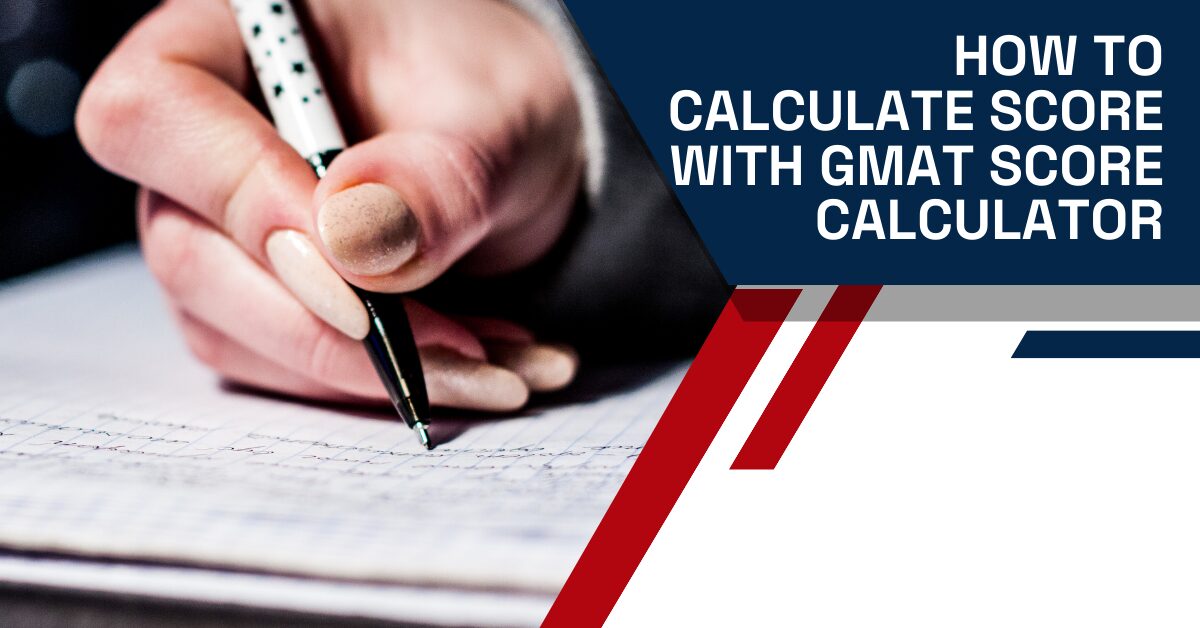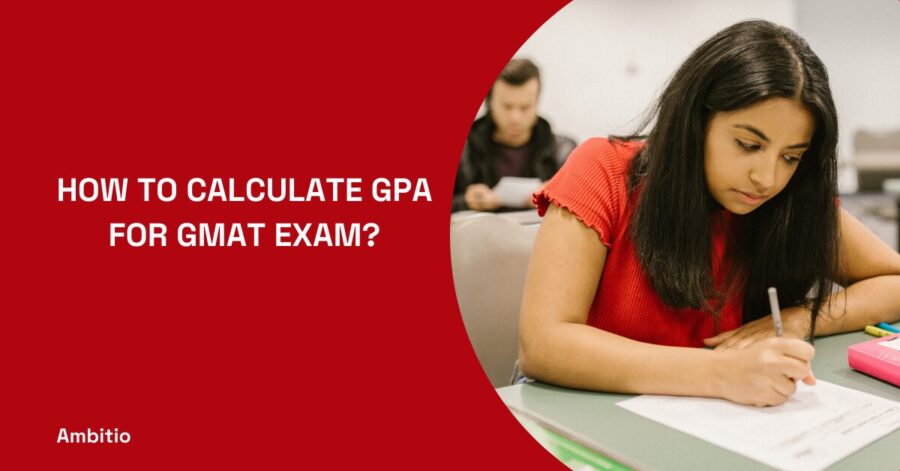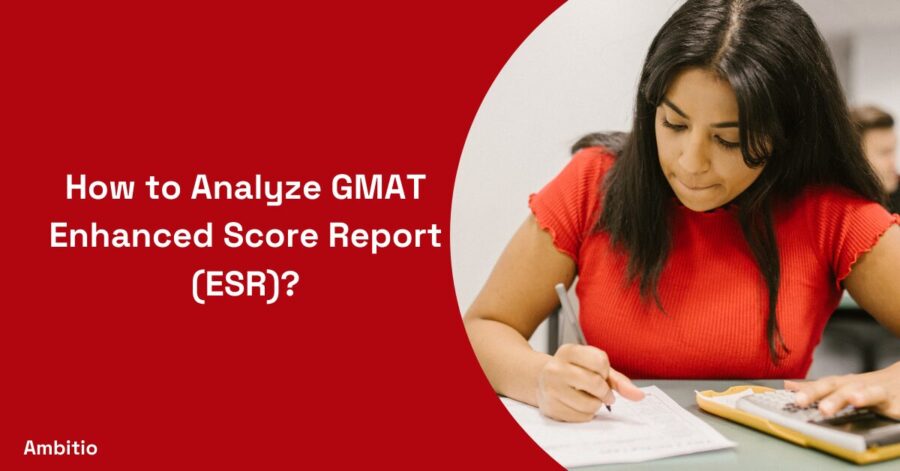11 September 2024
7 minutes read
How To Calculate Score With GMAT Score Calculator

Key Takeaways
- GMAT score calculators are useful tools for estimating your performance, but remember they’re not perfect predictors of your actual test day results.
- Understanding the complex GMAT scoring process, including raw score generation and conversion, can help you strategize your prep more effectively.
- GMAT Focus Score Charts are valuable for setting realistic goals, tracking progress, and fine-tuning your study strategy across different test sections.
- While a high GMAT score is important, don’t forget that business schools are ultimately looking for well-rounded leaders, not just test-taking experts.
Dreaming of an MBA from a top business school? You’re not alone. Every year, over 200,000 driven professionals face the GMAT, each hoping their score will open doors to prestigious programs. But let’s be real – deciphering GMAT scores can feel like cracking a secret code. You’re left scratching your head, wondering how your verbal and quant scores translate into that final number, and what it all means for your future.
Don’t sweat it – that’s where the GMAT score calculator comes to the rescue. Think of it as your personal GMAT decoder ring. It’s not just about crunching numbers; it’s about gaining clarity on where you stand and where you need to go. Stick with this guide, and I’ll show you how to harness this tool to demystify your GMAT scores, track your progress, and set achievable goals.
What Is A Good GMAT Score?
First things first: let’s tackle the burning question – what’s considered a “good GMAT score“? It’s not as cut-and-dry as you might think. Your maximum GMAT score, combining your performance in quantitative reasoning and GMAT AWA, is just the starting point. A GMAT score calculator can help you crunch the numbers, but understanding what they mean is key.
While the average GMAT score sits around 550, top business schools often seek candidates with GMAT scores of 740. Your ideal score depends on factors like your target schools’ averages and your overall application strength. A “good” score puts you in a competitive percentile for your goals.
Remember, your GMAT quant and GMAT verbal scores contribute to your overall score, and each section’s percentile matters too. A score calculator can break down these components, helping you gauge where you stand and where you might need to improve to reach that coveted “Highest GMAT score of 800” status.
Are GMAT Score Calculators Accurate?

GMAT score calculators can be quite accurate, but they’re not perfect. These tools typically use algorithms based on official GMAT prep data to estimate your total GMAT score from sectional scores. For most test-takers, they provide a reasonably close approximation of what matters in the actual GMAT exam.
However, it’s crucial to understand their limitations:
- GMAT is adaptive: The real test adjusts question difficulty based on your performance, which is hard for calculators to replicate precisely.
- Scoring complexity: The GMAT scoring system involves converting raw scores to scaled scores, then to percentiles. While good calculators account for this, they may not capture all nuances.
- Test day variables: Factors like stress or time management can affect your actual performance, which calculators can’t predict.
For best results, use comprehensive calculators that consider all sections (quant, verbal, integrated reasoning) and provide percentile rankings. While they’re valuable for estimating scores and setting goals during GMAT prep, remember that only the official GMAT can give you your true score.
How Are GMAT Scores Calculated?
Cracking the GMAT code isn’t just about acing practice tests – it’s about understanding the mysterious alchemy that transforms your answers into that coveted three-digit score. Ever wondered why your GMAT total score isn’t just a simple sum of correct answers? Or why two test-takers with the same number of right responses might end up with wildly different scores?
The GMAT scoring system is complex, reflecting the test’s adaptive nature and its aim to provide a comprehensive assessment of your abilities. Whether you’re using free GMAT resources or enrolled in a GMAT focus course, grasping this process can help you set a realistic target score and optimize your GMAT study time.
Here’s a step-by-step process of how GMAT scores are calculated:
Raw Score Generation
Imagine the GMAT as a high-tech sparring partner, constantly adjusting to your skill level. As you progress through the Quant and Verbal sections, the test adapts, serving up tougher questions when you’re on a roll and easing off when you stumble. This isn’t just to keep you on your toes – it’s a sophisticated method to pinpoint your abilities precisely.
Your raw score isn’t just a tally of correct answers. It’s a complex calculation considering both the number of questions you nailed and their difficulty. Pro tip: Leaving questions unanswered is like forfeiting points, so manage your time wisely!
The Score Conversion Magic
Once you’ve finished your intellectual boxing match, it’s time for the judges’ scorecards – or in this case, the conversion process. Your raw scores undergo a transformation, emerging as scaled scores ranging from 6 to 51 for both Quant and GMAT Verbal section questions.
This isn’t a simple point-for-point conversion. The process accounts for the varying difficulty of questions you faced. For context, a Quant score of 45+ or a Verbal score of 35+ puts you in the heavyweight category, percentile-wise.
Total Score Calculation
Now for the moment of truth – your total GMAT score. This three-digit number (ranging from 200 to 800) is what most test-takers and admissions committees focus on. It’s calculated using a proprietary algorithm that combines your Quant and Verbal scaled scores.
Interestingly, different combinations of section scores can lead to the same total. A 730, for instance, could result from various high-performing combos in Quant and Verbal. With the average score hovering around 550-570, anything above this is generally considered competitive.
Percentile Rankings
Your scaled and total scores are then compared to other GMAT gladiators to generate percentile rankings. These tell you what percentage of test-takers you’ve outperformed. If you’re in the 80th percentile, congratulations – you’ve bested 80% of your peers!
These rankings offer crucial context, showing how you stack up against the competition. Many business schools scrutinize these percentiles closely when evaluating applicants.
Additional Sections
While Quant and Verbal are the stars of the show, don’t forget about the other players. Integrated Reasoning (scored 1-8) and Analytical Writing Assessment (scored 0-6) don’t contribute to your 200-800 score but are reported separately. They’re like bonus features that schools use to get a fuller picture of your abilities.
Receiving Your Scores
After your GMAT performance, you’ll get an instant unofficial score report – think of it as a sneak peek. This includes your total score and section scores, minus the essay. The full official report, complete with all scores, percentile rankings, and your essay score, arrives a few weeks later, like a delayed but more comprehensive review of your GMAT journey.
What Are GMAT Focus Score Charts

GMAT Focus Score Charts are visual guides that show how different sectional scores translate into your total GMAT score percentile. They break down how your performance in Quant, Verbal, and Integrated Reasoning sections contributes to your overall score, which ranges from 200 to 800.
Why Should You Care?
- Target Score Clarity: Aiming for a score that’s above the average, like 730? These charts show exactly what quant score and verbal score you need to hit that mark.
- Section Strategy: Maybe you’re acing the quant section with a score of 45 or higher, but your verbal section score needs work. The charts help you see how boosting your verbal to 35 or higher could dramatically improve your total score.
- Percentile Perspective: Understanding GMAT focus percentiles gives you context. A score of 570 or 580 might be the average total GMAT score, but where does that really place you among test-takers?
- Adaptive Test Insight: The GMAT is an adaptive test, and these charts help you grasp how the scoring system adjusts based on question difficulty.
Making the Most of These Charts
- Benchmark Your Start: Use a free GMAT practice test to get your baseline scores. Plot these on the chart to see where you stand.
- Set Realistic Goals: Based on your target schools’ average GMAT scores, use the charts to set a realistic desired score.
- Track Your Progress: As you work through your GMAT preparation plan, whether it’s a GMAT focus course or self-study, regularly check your progress against these charts.
- Fine-tune Your Strategy: If you’re close to jumping to a higher score bracket, the charts can show you exactly where to focus for maximum impact.
- Understand Score Conversion: These charts demystify how raw scores from GMAT questions convert into your scaled sectional scores and final total GMAT score.
Pro Tips for Chart Use
- Remember, your GMAT score is more than just a number. It’s a score that’s calculated based on complex algorithms, considering both the number of questions answered correctly and their difficulty.
- Don’t fixate solely on the total score. Pay attention to section scores and percentile rankings for each score – many top schools look closely at these.
- Use an interactive score calculator alongside these charts for a more comprehensive GMAT prep strategy.
- When you receive your official score report, compare it to these charts. It can help you decide if you’re satisfied or if you want to retake the GMAT for a higher score.
Conclusion
Wrapping up, let’s cut through the noise. GMAT score calculators and charts are handy tools, but they’re not crystal balls. Use them to guide your prep, sure, but don’t let them dictate your worth as an applicant.
Remember, a 700+ score might turn heads, but it’s your unique experiences and vision that’ll truly set you apart. Business schools are looking for leaders, not just test-taking machines.
So, leverage these tools to understand where you stand and where you need to improve. But at the end of the day, focus on becoming the kind of applicant who brings something special to the table. That’s what really counts in the admissions game – and in your future business career.
Keep pushing, stay focused, and don’t lose sight of the bigger picture. You’ve got this.
Transform your GMAT preparation with Ambitio’s expert guidance. Our comprehensive approach includes personalized study plans, adaptive practice tests, and strategic insights, all designed to enhance your understanding and performance across the exam’s quantitative and verbal sections.
FAQs
What skills are tested on the GMAT?
The GMAT assesses writing, quantitative, analytical, verbal, and reading skills in English. It measures critical thinking, analysis, and problem-solving abilities.
How do I reschedule my GMAT exam?
You can reschedule your GMAT exam online between 1 to 14 days before the scheduled date by paying a fee of $165 for the test center exam or $180 for the online exam. Rescheduling 15-60 days out costs $110/$120, and more than 60 days out costs $55/$60.
How do I prepare for the GMAT?
What is the difference between the GMAT and GRE?
What does the GMAT syllabus cover?
How much does the GMAT cost?
The GMAT exam costs $275 at a test center or $300 for the online exam. There are also fees for rescheduling or canceling the exam, ranging from $55-$180 depending on the timing.

You can study at top universities worldwide!
Get expert tips and tricks to get into top universities with a free expert session.
Book Your Free 30-Minute Session Now! Book a call now




























